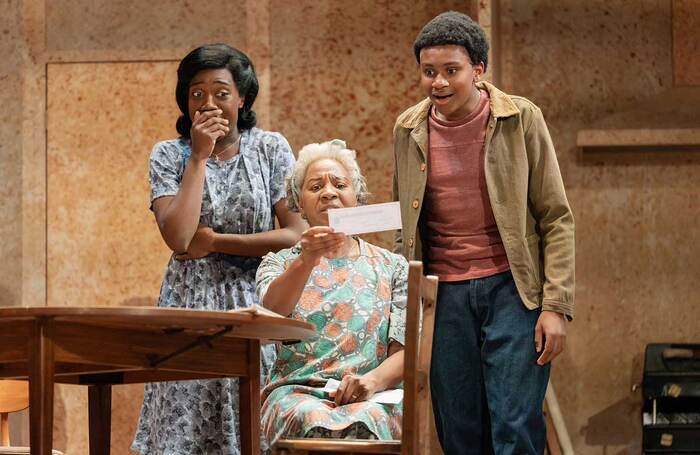A Raisin in the Sun made writer Lorraine Hansbury the first black female writer on Broadway in 1959. This highly humorous play and piece of history has been revived at the Lyric Hammersmith.
The play laid foundations for modern responses, Clybourne Park from Bruce Norris in 2010 and Beneatha's Place by Kwame Kwei-Armah which recently had an outing at the Young Vic. Although I've read the play, I watched A Raisin in the Sun last and it was a full circle moment to watch the original story of the unofficial trilogy.
A black family of three generations anxiously await a $10,000 insurance payout in the post following the death of Lena's husband. Lena (Doreen Blackstock), head of the family, her daughter Beneatha (Joséphine-Fransilja Brookman) son Walter Lee (Solomon Israel), his wife Ruth (Cash Holland) and their grandson Travis (Jeriah Kibusi) all live cramped together in the slums of Chicago in home infested and falling apart.
The play is written for black people about the black experience in post-war America. With themes of family, money, pride and race - It questions what happens to the dreams and ambitions we have to push aside and delay. As quoted in the play and in the words of black American poet Langston Hughes (1902-67), “dry up/ like a raisin in the sun.../ Or [will they] explode”?
Each family member has dreams of what life the insurance money could bring them. Lena decides to purchase a house in Clybourne Park, an all-white neighbourhood. After some initial mixed feelings, the family prepare for the move with plenty of tears, arguments and laughter along the way.
There are four visitors to the family home that represent wider reflections on race and perspective: Joseph Asagai is a young Nigerian student who awakens Beneathas sense of identity, George Murchison is a wealthy African American student and example of self-hatred manifesting and holding contempt for black people, Bobo represents mistrust as the other person duped by the dodgy business deal and Karl Lindner represents the committee for Clybourne park and more broadly some of the racist attitudes still held today in white America. It makes us think about the strength of the black dream in America being tested by the revolving door of perspectives.
I've been rather excited for the production to come to London. I wondered what they would do with it. For the most part, Tinuke Craig has kept it as is and it's a relief. It's funny and it's poignant. The sitcom style of the play works wonderfully in front of current audiences because the feelings are all the same. I feel like we need to see the house (wonderfully designed by CécileTrémolières) and the clothes (Maybelle Laye) and the characters exactly as they were in 1959. The story and its messages are timeless.
The company are outstanding, Doreen Blackstock is commanding to watch, Kenneth Omole and Joséphine-Fransilja Brookman make for a charming Joseph and Beneatha, Solomon Israel stuns in the marathon role of Walter Lee and most importantly the family feel real.
It's black joy, it's black anguish and it's full of touching moments.
It runs until 2 November.
Review: Nicole Botha Photo: Ikin Yum

